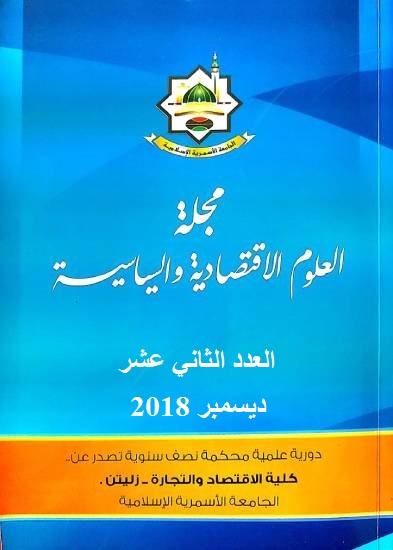أثر طول فترة الارتباط على استقلالية المراجعين
دراسة تطبيقية على مكاتب المراجعة بطرابلس
الملخص
استهدف البحث دراسة أثر طول فترة الارت بـاط بـين المـراجعين الخارجيين وعملائهم محل المراجعة على استقلالية المراجع الخـارجي مـن وجهة نظر المراجعين الخارجيين العاملين في مكاتب المراجعة فـي ليبيـا. ولأجل الوصول إلى تحقيق هذا الهدف، قُسم البحثُ إلى أربعة أجزاء رئيسة، حيث عرف في الجزء الأول بمشكلة الب حث وهدفه وأهميته، في حين خُصص الجزء الثاني لبناء الإطار النظري للبحث، أما الجزء الثالث فقد كُرس لعرض الجوانب المتعلقة بالدراسة الميدانية، وأخيراً تناول الجزء الرابع عرضاً لأهم النتائج التي تَّم الوصول إليها، بالإضافة إلى تقديم بعض التوصيات المقترحة. وقد أظهرت النتائج المتحصل عليها من خلال تحليل البيانات تـأثر استقلالية المراجع الخارجي بشكل كبير ببعض الحالات المتعلقة بطول فتـرة الارتباط مثل: استخدام بعض المراجعين لأساليب وإجراءات روتينية وبسيطة في عمليات المراجعة، وعدم قدرة بعض المراجعين على اكتشاف التلاعـ ب بنتائج الأعمال المعلن عنها. وفي الجانب الآخر أظهرت النتائج عـدم تـأثر استقلالية المراجع ببعض الحالات الأخرى مثل: استمرارية العلاقة التعاقديـة بين المراجعين وعملائهم لمدة ثلاث سنوات متتالية، وعدم نـشؤ نـوع مـن التواطؤ بين المراجع وبين أعضاء مجلس الإدارة بالشركة العميلة بسبب طول فترة الارتباط.
المراجع
- أحلام احمد عليان ابورياش "اثر معدل دوران المراجـع الخـارجي علـى جـودة المراجعة"، رسالة ماجستير، الجامعة الإسلامية، غزة، فلسطين (2013. (
- صالح حامد محمد على وحسن الطيب عبداالله خالد، "تحليل العلاقة بـ ين عوامـل تغيير المراجع الخارجي ودوره في إطار حوكمة الشركات،" مجلـة كليـة التجـارة العلمية، جامعة النيلين، العدد (1 (، المجلد (1 (، الصفحات (89 – 122 (،) 2015. (
- مجلس قيادة الثورة، قانون تنظيم مزاولة مهنة المحاسبة والمراجعة في ليبيـا رقـم -31970 لسنة) 116)
- محمد أسامة إبراهيم أبو القمصان "العوامل المؤثرة على استقلالية وحيـاد المراجـع الخارجي"، رسالة ماجستير، الجامعة الإسلامية، غزة، فلسطين (2007. (
- مؤتمر الشعب العام، القانون رقم (9 (بشأن مزاولة الأنشطة الاقتصادية. - موسوعة التشريع الليبي، مجموعة القانون التجاري والقا نون البحـري والقـوانين المكملة لها، دار المعارف بمصر، 1966
- Abu Bakar, N. Abdul Rahman, A. and Abdul Rashid, H. M. (2005), “Factors influencing auditor independence; Malaysian loan officers’ perceptions”, Managerial Auditing Journal, Vol. 20, No. 8, pp. 804-822.
- Adeniyi, ang Mieseigha, (2013), "Audit Tenure: An Assessment of its Effects on Audit Quality in Nigeria", International Journal of Academic Research in Accounting, Finance and Management Sciences, Vol. 3, No.3, July 2013, pp. 275–283
- Alleyne, P, A. Devonish, D. and Alleyne, P. (2006), “Perceptions of auditor independence in Barbados”, Managerial Auditing Journal, Vol. 21 No. 6, pp. 621-635.
- Almalhuf, B. A. (2014), “Perceptions of Libyan external auditor independence”, National Magazine of managment, Tripoli, Libya, No 13, PP5- 40.
- American Institute of Certified Public Accountants. (1978), Commission on Auditors’ Responsibilities: Report, Conclusion, and Recommendations, AICPA: New York.
- Arel, B. Brody, R. and Pan, K. (2005), “Audit firm rotation and audit quality”, The CPA Journal, January. Available at www.nysscpa.org/cpajournal/2005/105/special issue/essential/p36.htm, accessed on 10-10-2007.
- Auditing Practices Board, Ethical Standards (2004).
- Augustine. O. Okobie, (2014), "AUDITOR TENURE, AUDITOR INDEPENDENCE AND ACCRUAL – BASED EARNINGS MANAGEMENT OF QUOTED COMPANIES IN NIGERIA", European Journal of Accounting Auditing and Finance Research Vol.2. No.2, pp.63-90
- Carren, C. (2013). Factors influencing auditor' independence and accountability. Maasai Mara University.
- Commerce Innovations, 4 (2), 680-689.
- Federation des Experts Comptables Europeans (FEE). (2002), “The role of accounting and auditing in Europe”, May.
- Flint, D. (1988), “Philosophy and procedures of auditing: an introduction”, Macmillan, London.
- Gates, S. Lowe, D, J. and Reckers, P. M. J. (2007), “Restoring public confidence in capital markets through auditor rotation”, Managerial Auditing Journal, Vol. 22, No. 1, pp. 5-17.
- Gates, S. Lowe, D, J. and Reckers, P. M. J. (2007), “Restoring public confidence in capital markets through auditor rotation”, Managerial Auditing Journal, Vol. 22, No. 1, pp. 5-17.
- Geiger, M. and Raghunandan, K. (2002), “Auditor tenure and audit reporting failures”, Auditing: A Journal of Practice and Theory, Vol. 21, No. 1, pp. 67-78.
- Ghosh, A. and Moon, D. (2005), “Auditor tenure and perceptions of audit quality”, the Accounting Review, Vol. 80, No. 2, pp. 585-621.
- Gul, F. A. Jaggi, B. L. and Krishnan. G. V. (2007), “Auditor independence: Evidence on the joint effects of auditor tenure and nonaudit fees”, Auditing: A Journal of Practice & Theory, Vol. 26, No. 2, pp. 117-142.
- Harrisen M. Omondi, (2017), "INTERNAL FACTORS INFLUENCING EXTERNAL AUDITORS INDEPENDENCE AMONG PRACTICING ACCOUNTANTS IN KENYA", Unpublished MASTER Dissertation, KCA UNIVERSITY.
- Hudaib, M. (2003), “Understanding auditor independence in Saudi Arabia: perceptions of selected groups of auditors and users”, unpublished PhD Thesis, University of Essex, Colchester.
- Hussey, R. and Lan, G. (2001), “An examination of auditor independence issues from the perspectives of UK finance directors”, Journal of Business Ethics, Vol. 32, pp. 169-178.
- Institute of Chartered Accountants of England and Wales (ICAEW). (1997), Guide to Professional Ethics, “Integrity, Objectivity and Independence”, Institute of Chartered Accountants in England and Wales.
- Jackson, A. B, Moldrich, M. and Roebuck, P. (2008), “Mandatory audit firm rotation and audit quality”, Managerial Auditing Journal, Vol. 23, No. 5, pp. 420-437.
- Mautz, R. K. and Sharaf, H. A. (1961), “The Philosophy of Auditing”, American Accounting Association, New York.
- Mohamed, H., & Albeksh, A. (2016, October). Factors affecting the independence of the external auditor within the auditing profession. International Journal of Management and
- Pallant, J. (2007), “SPSS survival manual”, Open University Press, Buckingham.
- Petty, R. and Cuganesan, S. (1996), “Auditor rotation: Framing the debate”, Australian Accountant, Vol. 66, No. 4, pp. 40-42.
- Sarantakos, A. (1998), Social research”, second edition, MaCmillan Press, London.
- Sarbanes-Oxley Act (2002).
- Schleifer, L. L. F., and Shockley, R. A. (1990), “Policies to promote auditor independence: More evidence on the perception gap”, Journal of Applied Business Research, Vol. 7, No. 2, pp. 10–17. - Sekaran, U. (2003), “Research methods for business”, Fourth Edition, John Wiley & Songs, Inc.
- Shockley, R. (1982), "Perceptions of auditor independence; A conceptual model", Journal of Accounting, Auditing & Finance, PP, 126-143.
- Sonja Elisabeth Oberleitner, (2017), "The impact of auditor rotation on audit quality", Master thesis, Umeå university, School of Business and Economics, Sweden.
- St. Pier, K. and Anderson, J. (1984), “An analysis of the factors associated with lawsuits against public accountants”, the Accounting Review, Vol. 59, No. 2, pp. 242-263.
- Stevenson, J. E. (2002), “Auditor independence: a comparative descriptive study of the UK, France and Italy”, International Journal of Accounting, Vol. 6, pp. 155-182.
- Tahinakis, P. and Nicolaou, A. (2004), “An empirical analysis on the independence of Greek certified auditor-accountant”, Accounting Business and the Public Interest, Vol. 3, No. 1, pp. 32-47.
- US Senate. (1976), Subcommittee on Reports, Accounting, and Management of the Committee on Government Operations (Metcalf report), the Accounting Establishment: A Staff Study, December, Washington D.C: Government Printing Office.
- Wines, G. (2006), “The connotative meaning of independence in alternative audit context: An exploratory study”, Pacific Accounting Review, Vol. 18, No. 1, pp. 90-122.
التنزيلات
منشور
إصدار
القسم
الرخصة
الحقوق الفكرية (c) 2018 مجلة العلوم الاقتصادية والسياسية

هذا العمل مرخص بموجب Creative Commons Attribution 4.0 International License.





